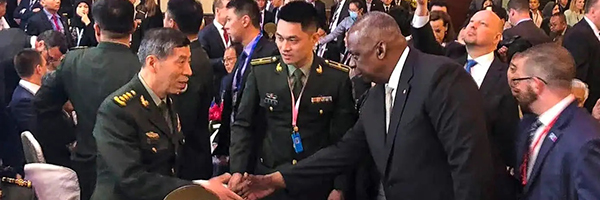US-China War Risks Grow as Beijing Sees Little Point in Talking to Biden’s Team
 Lanxin Xiang, Orinoco Tribune, Jun 18, 2023 —
Lanxin Xiang, Orinoco Tribune, Jun 18, 2023 —
Beijing is no longer keen on holding high-level talks with the US government, because it has pretty much given up on the Biden administration, which is widely seen by China’s political elite as incompetent, ignorant about Chinese culture and history and extremely arrogant.
Instead, Beijing may well be betting on the next presidential election to produce anyone but Joe Biden. Even Donald Trump, it would appear, can be dealt with because the former president put his cards on the table, disliked military alliances and loathed war.
On the issues of Taiwan, economic competition and geopolitical rivalry, serious communication between the two sides has become all but impossible, never mind negotiations based on common ground.
The sudden US urge for high-level diplomacy is thus seen as being motivated by two factors: the desire to alleviate the fears of its allies that the lack of communication may lead to another war, and to promote a propaganda campaign that China is being unreasonable.
A fundamental lesson that policymakers on both sides must learn is that, in great power diplomacy, one should never offer something the other side does not really need, or ask for anything the other side can never give. In other words, identifying and respecting each other’s vital interests, or red lines, is the only way to avoid war.
Not since the Cold War have we witnessed such a dangerous situation. It has become the new normal that the two most powerful nations talk past each other most of the time.
In the first decade of the last century, Britain was preoccupied with its “German problem”. The two powers had no clearly defined conflicting interests. Yet Britain saw itself as the defender of the status quo and imperial Germany as the challenger. Both sides made strategic mistakes. Their diplomatic efforts were often confounded more by a mismatch of intentions and temperaments than by real national interests, which were, in many respects, parallel.
The Anglo-German alienation was not created by bad intentions and devious long-term designs. Germany tried hard to show Britain the value of its friendship through offering a kind of Teutonic alliance for avoiding war with each other. A vicious circle started, however, when Germany began to show displeasure over what it considered to be the illogical and uncooperative behaviour of Britain for not considering such an alliance seriously.
In reality, Britain’s overriding concern was the challenge by France and Russia to its vast empire overseas, and Germany posed little threat to its position. But London was often unable to get its message through. Berlin decided that expressions of anger would be more persuasive. The Kaiser considered Britain’s intransigence to have been caused by Germany’s show of weakness.
What started as a serious effort to identify mutual interests slowly degenerated into a conflict at all levels. Any analysis of US–China relations should focus on how to avoid a similar misreading of the other side’s intentions. As the war in Ukraine reminds us, misunderstanding and miscommunication can lead to war.
Similarly, Biden’s central premise is that China is trying to challenge the status quo. China is seen as a rapidly rising power with a grudge against the liberal international order. The world must thus prepare for a struggle between democracy and autocracy, and there is no middle way.
But today, just who is defending the status quo, the United States or China? It is Washington that looks more like Wilhelmine Berlin. At the very moment of China’s decision to integrate fully into the existing international system, the US under Trump and Biden started to change the rules of the international order it created after World War II.
Just as China aspires to become a normal state, by which it means a self-sufficient great power which has had no urge for territorial expansion in its history, the criterion for “normal” is changing. As China has adopted multipolar diplomacy for maintaining peace in its foreign relations, the US has returned to a unipolar fantasy by building more military alliances for cold-war-style bloc politics.
In the security area, what the US offers China is peace in the Taiwan Strait, contingent on Beijing’s acceptance of there being two separate Chinese territorial entities: one China, one Taiwan. China can never accept this. In the economic area, the US offer is even less convincing. It recently adopted the European Union’s language, walking back on “decoupling” to embrace “de-risking”. This is meant as a gesture of goodwill towards China. But to Beijing, it makes little sense.
First of all, the Chinese leaders are psychologically prepared for decoupling and have begun to build various defensive systems, including through de-dollarisation of the international trade market. They are also aggressively promoting an autonomous hi-tech strategy. Secondly, China’s leaders are convinced that the overall US strategy is to contain China all round.
Third and most importantly, from the Chinese point of view, the biggest risk for both sides is the question of Taiwan, and the US side does not appear willing to do anything to “de-risk” the issue. Instead, it has heightened risks with such moves as high-level visits to the island.
As a result, Beijing is no longer so interested in communication, and exchanges between the two militaries have been kept minimal. The two most powerful nations have entered a perilous phase of miscommunication and mis-signalling–which usually occurs as a prelude to an unexpected war.
*
Lanxin Xiang is professor emeritus of the Graduate Institute of International and Development Studies in Geneva and a visiting scholar at the Belfer Centre, Harvard Kennedy School.
